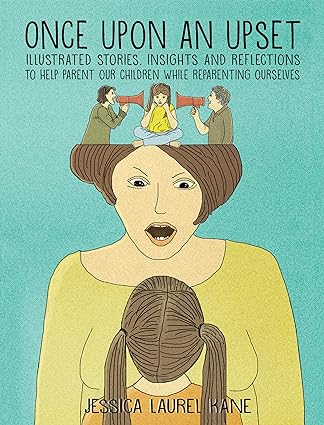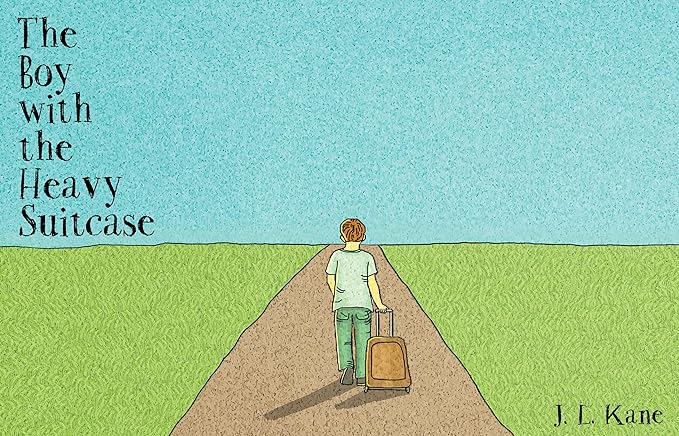The following is a contributed post from Jessica Laurel Kane, author of Once Upon an Upset and The Boy with the Heavy Suitcase.

Here’s a story about someone I know…
When he was a kid, he was expected to do a lot of work around the house. His other siblings, not so much. But this kid was made to repair and build and paint and on and on.
And one day, he was up on a ladder, painting siding on the second floor of his house. It was the highest he’d ever climbed. And his dad, who was footing the ladder, said, “Don’t worry, I got you.“ And then he shook the ladder, and laughed.
The boy held on tight as the ladder wobbled underneath him and he saw his dad laughing. “You scared?” his dad taunted.
Emotions Weren’t Allowed
This was not the first time his dad behaved this way. And the boy was scared. But in that moment, he knew that to retain any sense of himself and to survive with his dignity in tact, he had to do something besides play the victim.
After all, his family made fun of people who cried.
Every time his feelings were hurt, they told him it was a joke, as if they wanted him to laugh along at his own expense.
“Oh boo hoo,” they’d say. “I was only kidding. Relax.”
But the boy didn’t think being shaken on a ladder was very funny at all. So, he looked down at his dad and he let go of the can of paint.
The can dropped, slamming hard on the ground, paint splattering everywhere.
And his dad, he just shook his head at the mess and kind of laughed, in a less amused way than before.
You might also like to read: A Psychotherapist Shares 6 Rules She Follows When Parenting Teens
Learning to Survive
Because of his dad, this boy developed an identity to survive disrespectful, toxic behavior. The moment this boy felt scared or vulnerable, he’d shift into survival mode, knowing he didn’t have a safe place to share his feelings, and he’d lash out instead.
As the years continued on, this boy turned into an adult, but with those same 12-year-old upsets.
Meaning, every time he felt like someone was shaking the proverbial ladder that he’d been depending on, he’d drop the proverbial paint.
The problem was, he began to assume everyone was shaking the proverbial ladder, even when they weren’t.
Raising His Own Children Differently
Eventually, he had a family of his own, and after enough times of dropping the proverbial paint and making a big mess, he began to realize that this behavior wasn’t serving him or the people around him, whom he loved so dearly.
This wasn’t who he wanted to be. He didn’t want to give his family the same miserable experience he had.
He wanted other feelings in his palette besides anger and happiness. He wanted to be with sadness and fear and vulnerability. And he wanted to create a safe space for his loved ones to be with all of their feelings too. He wanted to trust his family’s love for him and be trusted with their love.
Since then, he’s been working on healing those unhealed parts of himself. He’s been working on going back in time and letting that younger part of himself know that what he dealt with all those years ago was not okay.
And he thanks that younger part of himself for surviving in the only way he knew how, and he lets the boy know that he’s safe now. That he’s loved now. That his feelings matter—all of them.
And he looks around at his loved ones and he really gets that their feelings matter too. That their feelings are precious, never something to be laughed at, or mocked.
You might also like to read: My Pre-Teen Son Is the One With All the Powerful Emotions
Parenting Means Doing the Hard Work and Healing Our Own Pain
These days, when he starts to feel like someone is shaking his proverbial ladder, intentionally trying to undermine his sense of himself, he pauses before he reacts.
He checks in with himself first, and then with the person, and he lets them know that what they’re doing has made him feel unsafe and then he asks if they can share what’s happening from their perspective.
He also listens when his loved ones tell him that something he’s done makes them feel unsafe, and he makes sure to shift his behavior, because their feelings matter that much to him.
He’s learned that not everyone is like his father. And that he doesn’t have to be like that either.
That disrespectful behavior stems from a self that never felt respected. It’s an initiation into a legacy of toxicity, all in order to avoid the feeling of being vulnerable and lacking a supportive foundation.
A Broken Boy Grew into a Strong, Loving, Stable Father
But lately, this boy, now an older man, realizes that creating a stable foundation for the self is how you create an environment where love and abundance and creativity and joy are able to flourish.
And these things are what this man now values.
And sometimes he feels sad for his father, now long gone, for his imagining that there was strength in mocking someone’s vulnerability. Because his father missed out on what could have been a really incredible relationship.
To read more about healing from toxic parenting as you learn to parent your own kids will love and support, check out Jessica Laurel Kane’s books:
Once Upon an Upset: Illustrated Stories, Insights and Reflections to Help Parent Our Children While Reparenting Ourselves is an illustrated collection of stories, insights and reflections to help parent our children while reparenting ourselves.

The Boy with the Heavy Suitcase is a story about a boy who carries around a suitcase full of upsets―until his friend helps him figure out a better way to handle them.

Parenting teens and tweens is hard work, but these posts might help:
Motherhood During These Hard Teen Years Can Absolutely Crush You
How To Stop Arguing With Your Teen: 10 Tips For Parents
10 Commons Battles that Will Destroy the Relationship with Your Teen
*This post may contain affiliate links where we earn a small commission for purchases made from our site.





Leave a Comment